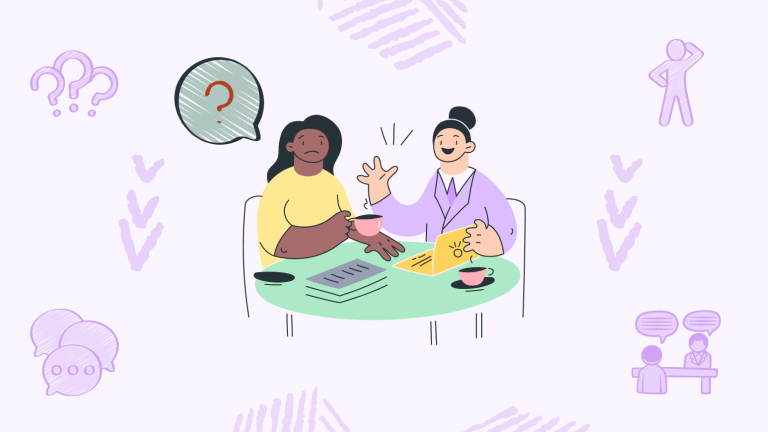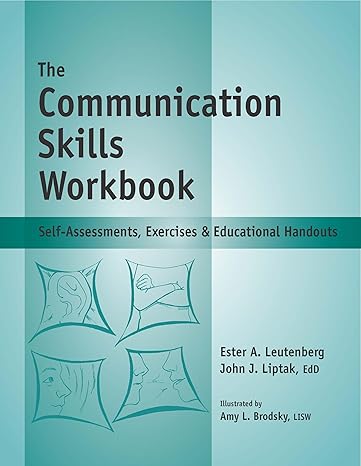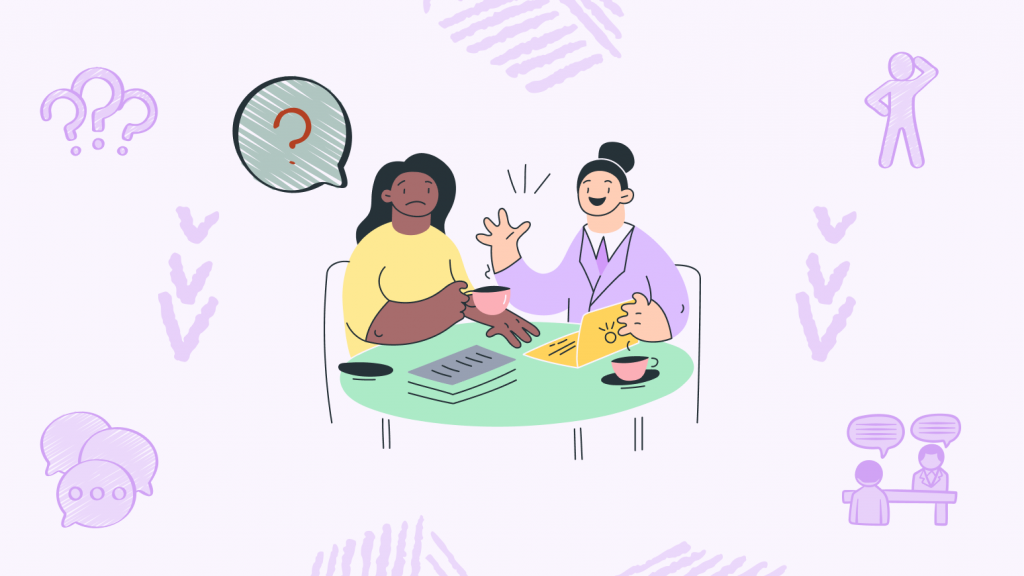“Too many feelings, hard to explain; struggle to find the right words, where to complain?”
It can never be easier to explain your feelings and thoughts when you are not good at communicating with others.
Did you find yourself in a situation where you wanted to share your thoughts or be a part of the conversation and were hesitant due to lower confidence in your communication skills? Or in a situation where you are trying to make a point but finding it hard to use the correct words to express your opinion.
These situations not only lower your confidence but also make you feel disheartened. To regain your confidence and enhance your communication skills, you need to focus on improving your listening and speaking skills.
Here are some effective ways to improve your communication skills and boost your confidence.
What is Effective Communication?
If you are one of those people who fail to convey their ideas clearly, then you must understand the concept of effective communication and how it can provide value to your life.
The ability to convey information and ideas clearly and accurately is known as effective communication. It is not just about communicating by writing or speaking but also includes listening and understanding the message given by others. This process works for both sides when the sender and receiver actively exchange their information.
Good communication skills help bridge the gap between understanding and conveying the message, build relationships, and resolve conflicts.
Why Having Good Communication Skills is Important?
Have you ever felt that something is lacking that is not letting you build a strong relationship or have the career you desire? The only thing lacking is good communication skills, which, once improved, can boost your confidence and eliminate insecurities.
Communication is the key to success.
A person who masters effective communication can have a positive effect on his personal relationships by encouraging trust and understanding. Not only does it impact your personal life, but it also makes it easy to communicate and enhances your showcasing of qualities at work.
According to a study, around 60% of people believe that poor communication is the major cause of misunderstandings. Nonverbal communication, which adds up to 55% of all communications, plays a critical role in conveying our emotions and intentions.
We can take the example of a manager who can clearly communicate empathy to his employees, boosting their morale and productivity. On the other hand, poor communication can lead to stress and conflicts, which also affects the overall performance of the employees.
A master in communication can break any deal.
Effective Ways to Improve Your Communication Skills
Now, we understand how important it is to have good communication skills to make a positive impression, enhance self-confidence, and build trust.
Here, you will see some of the most effective ways to improve your communication skills that you can easily incorporate into your life.
#1: Practice Active Listening
Imagine you are sitting in an important meeting where your colleagues are sharing some critical concerns, and you are thinking about your response instead of truly listening.
This is a very common scenario that leads to misunderstanding and results in poor performance. You can overcome this situation with active listening, which is not just hearing words. It involves truly concentrating, understanding, and remembering what other people are saying.
Research shows that people who are active listeners enhance their relationships and build trust. According to some studies, active listening can reduce workplace errors by up to 40%, which greatly impacts both personal and professional life.
- Focus on the speaker
You have to make sure that you are making eye contact with the speaker, avoiding any distractions.
- Show that you’re listening
Make sure to nod occasionally and use small verbal comments like “yes” or “I see.”
👉 Pro Tip
Listen with the intent to understand, not just to reply. Before you respond, summarize what the speaker said in your own words to ensure you’ve fully grasped their message.
#2: Understand Nonverbal Communication
Have you ever been in a situation where you misinterpreted someone’s intentions because their language didn’t match with their words? This kind of disconnected conversation can cause confusion and a sense of doubt.
Nonverbal communication holds 55% of our interactions and includes gestures, facial expressions, and posture, impacting most of our conversations. It is essential to understand these signs for effective communication.
If you are making eye contact consistently, it indicates that you are confident, while on the other hand, if you have your arms crossed, it shows defensiveness. You can enhance your ability to communicate and connect with others by being aware of these subtle signals.
- Observe body language
It is important to observe body language to better understand the conversation and intentions. You must notice posture, eye contact, and movements.
- Match your nonverbals
We understand it is important to match your expressions with your words to give a positive impression. You must ensure that your body language aligns with your words.
👉 Pro Tip
Mirror the speaker’s body language subtly to build rapport. For example, if they lean forward, lean in slightly as well. This creates a subconscious connection.
#3: Think Before You Speak
Have you ever regretted saying something you didn’t actually mean but blurted out in the heat of the moment? Impulsive speech not only creates misunderstanding but also raises conflicts.
It’s OK to be angry.
However, it is also important to take a moment to think before you speak, allowing yourself to organize your thoughts and choose the correct words to say. If you practice speaking carefully, it helps convey your message clearly and avoid unnecessary misunderstandings.
As per some research, people who pause and reflect before they speak are perceived as more thoughtful and considerate speakers.
- Pause and reflect
It is important to briefly pause before responding or speaking to deliver your message and make a positive impact.
- Choose your words carefully
When you speak to someone, make sure that you are aiming for clarity and precision.
👉 Pro Tip
If you’re unsure about what to say, it’s okay to pause and collect your thoughts. A well-considered response is better than a rushed one.
#4: Be Clear and Concise
Sometimes, a lengthy explanation from someone that could have been summed up in a few words might confuse or bore you. In this scenario, clear and concise communication becomes important for effective interaction and making the other person understand your words.
A clear communication can resolve any conflicts.
To practice clear communication, you must avoid using jargon or language that is too complex to understand and makes it difficult to deliver your message. Apart from that, you can aim to speak in a straightforward manner and focus on your communication.
Studies have shown that people remember clear and concise messages more effectively, making them effective during high-stakes situations.
- Keep it simple
When conversing with someone, try to use plain language with short sentences to make it more precise.
- Stay on topic
It is important to stay on the topic that you are talking about and avoid unnecessary details that can confuse the listener.
👉 Pro Tip:
Use the ‘KISS’ principle – Keep It Simple and Straightforward. If you can say something in fewer words, do so.
#5: Watch Your Tone
Have you been in a situation where you said something that you thought was harmless but was taken incorrectly because of your tone?
A calm, gentle, and firm voice is always mesmerizing and pleasant.
The tone of your voice plays an important role when you are having a conversation and want the other person to listen to you carefully. You should always use a warm and friendly tone to encourage openness and collaboration. Using a harsh tone only creates barriers and tensions.
Research shows that 38% of communication is affected by the speaker’s tone, empowering and conveying the message you want to deliver.
- Be aware of your pitch and volume
You must be aware of your tone when you are communicating with someone and avoid speaking too loudly or softly.
- Maintain a positive tone
Always maintain a positive tone with calmness and respect in your words.
👉 Pro Tip
Record yourself speaking and play it back. Listening to your tone objectively can help you adjust it for better communication.
#6: Manage Your Emotions
Many emotions and thoughts can sometimes affect your communication and cloud your judgment. If you have been in a similar situation, then it is essential to manage your emotions.
Understanding emotional intelligence, which helps you recognize and manage your emotions, is important for effective communication. Another way to improve your communication skills is using a Communication Skills Workbook, making it easier to manage your feelings.
According to some research, people who have high emotional intelligence can better handle complex conversations and resolve conflicts. You can opt for techniques like deep breathing and meditation to help you stay composed and calm during challenging conversations.
- Recognize your emotions
To convey your message effectively, you must recognize your emotions and understand how they affect your communication.
- Stay composed
It is important to stay composed during tough conversations. To manage stress, you can practice techniques like deep breathing.
👉 Pro Tip
When emotions are high, practice the 10-second rule: Take ten deep breaths before responding to diffuse your initial emotional reaction.
#7: Be Patient
Think of a situation when you rush a conversation and then later realize that you have missed some important details. It is important to be patient when having a conversation so that you can exchange your thoughts and reduce any kind of misunderstanding.
Research shows that communicators who are patient can build stronger and more trusting relationships. If you want to have a meaningful conversation that shows your respect, make sure you are patiently listening to the other person and giving them time to express their thoughts and feelings.
- Give time to others
It is important to give others enough time to express their thoughts fully.
- Avoid interrupting
For a healthy conversation, it is essential to let the speaker finish before you respond.
👉 Pro Tip
If you feel the urge to interrupt, remind yourself that effective communication is a two-way street. Give the other person space to share their thoughts fully.
#8: Build Assertiveness
You might be in a position where you are trying to express your feelings and getting frustrated when you cannot express your needs clearly. Being assertive means expressing your feelings confidently and respectfully and balancing positivity and aggression.
Research has shown that assertive people are more likely to achieve their goals without causing unnecessary conflicts.
It is important to state your needs clearly and respectfully to establish boundaries and communicate effectively to maintain a healthier relationship.
- State your needs clearly
You must use “I” statements to express yourself, making it easier for the other person to understand your requirements.
- Be respectful
‘It is important to balance assertiveness with consideration for others.
Quick Question
How could you have expressed your needs more assertively in a situation where you found it difficult to say ‘no’?
#9: Show Empathy
Have you ever felt that you are truly understood when someone listens to you with empathy? Did you ever feel that you were connected emotionally to the other person while expressing your feelings?
Empathy is the ability to connect with others on an emotional level, building trust and strengthening relationships.
According to some research, empathetic communicators are more successful professionally and personally because they can build more profound and meaningful connections. If you can listen to others with empathy and respond with care, you can show them that their feelings are valued.
- Listen with empathy
When you communicate with others, try to listen to their feelings with empathy and understand their perspectives.
- Respond with care
It is important to show that you value their feelings and experiences.
Quick Question
What specific actions helped you feel confident the last time you spoke in front of others?
#10: Speak with Confidence
You might wonder how some people can speak with confidence and command attention. Having confidence while communicating with others helps convey your message more effectively.
Clear communication, good posture, and maintaining eye contact are key to effectively communicating. It will make your message more compelling and engaging.
- Practice confidence
To exude confidence, you must work on your body language and tone.
- Prepare in advance
It is important to be familiar with your topic to boost your confidence.
👉 Pro Tip
Stand tall and maintain eye contact. Even if you don’t feel confident, these small actions can help project confidence and, in turn, make you feel more assured.
Summary
Now that we understand how important it is to improve your communication skills with continuous practice and awareness. You must always focus on active listening, understanding nonverbal cues, and practicing patience. Another important thing to keep in mind while communicating is assertiveness, empathy, and confidence, which enhance your ability to communicate effectively.
Incorporating these skills into communication plays an important role in building a better relationship, resolving conflict, and achieving personal and professional success.
Effective communication is not just about what you say but how you say it and how well you listen.
“Listening carefully, connecting to what they say, makes a path for building trust and lifting each day.”
🎭 Activities You Can Practice To Boost Your Communication Skills:
- Take turns speaking with a partner for 2 minutes, focusing on fully understanding without interrupting, then summarize what you heard.
- Watch a conversation video without sound, observe body language and facial expressions, then compare your interpretation with the actual dialogue.
- In your next heated discussion, pause for a few seconds before responding, and afterward, reflect on how this pause influenced the outcome.
- Write a complex idea in 3-4 sentences, then simplify it to one concise sentence and ask a friend if they clearly understand your message.
- Record a conversation or speech, then listen back to assess your tone, pitch, and volume, identifying areas for improvement.
- When emotions arise in a conversation, practice deep breathing, then reflect on how managing your emotions affected the exchange.
- In your next conversation, refrain from interrupting and let the other person finish, then notice how this affects the flow and depth of the discussion.
- Role-play with a friend to practice assertively expressing your needs, focusing on clear and respectful communication.
- Reflect on a recent conversation where you could have shown more empathy, and practice this in future interactions.
- Stand in front of a mirror, deliver a short speech with eye contact, good posture, and a strong voice, then review a recording to identify improvements.
Sources
- City of Bowie (Government Website by CivicPlus): Effective Communication
- University of Maine: Effective Communication
- California State University, Dominguez Hills: Effective Communication Practices
- Kansas State University, Manhattan, KS: Communicating Effectively





















